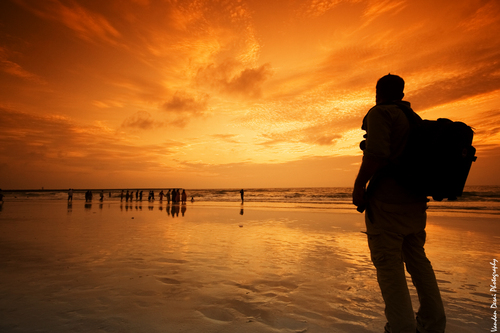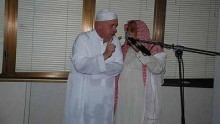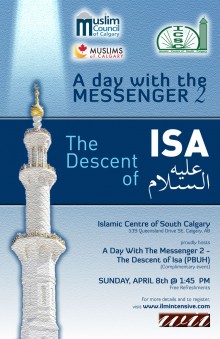FOR EVERY MUSLIM BROTHER WHO THINKS HES A RUDEBOY! OR GANGSTER!
Posted in Daily IslamApril 5, 2012No comments
Posted in Daily IslamApril 5, 2012No comments
Posted in Daily Islam,HadithApril 5, 2012No comments
“Whoever believes in Allah and the Last Day, should not hurt his neighbour and whoever believes in Allah and the Last Day, should serve his guest generously and whoever believes in Allah and the Last day, should talk what is good or keep quiet.”
[Sahih Al Bukhari Vol.8, Book 78, No. 6018]
Posted in Daily Islam,QuranApril 5, 2012No comments
How many an animal there is that does not carry about its sustenance. Allah provides sustenance to them and to you. He is All-Hearing, All-Knowing.Surah Al-Ankabut [29:60]
Posted in Daily Islam,HadithApril 5, 2012No comments

 Ibn Umar (Radhiallahu ‘Anhum) said: Allâh’s Messenger (Sallallahu ‘Alaihi Wa Sallam) took me by my shoulder and said: “Be in this life as if you were a stranger or a traveller on a path.” Jâmi’ al-U’lûm wal-Hikam [1] Hadîth #40:
Ibn Umar (Radhiallahu ‘Anhum) said: Allâh’s Messenger (Sallallahu ‘Alaihi Wa Sallam) took me by my shoulder and said: “Be in this life as if you were a stranger or a traveller on a path.” Jâmi’ al-U’lûm wal-Hikam [1] Hadîth #40:
Ibn Umar used to say, “If you reach the evening then do not expect to reach the morning, and if you reach the morning then do not expect to reach the evening. Take from your health before your sickness, and from your life before your death.” – [Reported by al-Bukhârî]
This hadîth is the foundation for limiting one’s hope in this life. So a believer must not take this life as a homeland or permanent residence, his heart being tranquil and resting assured within it. Rather, he must be in it as if he were on a journey, preparing himself to depart. The advice of the Prophets and their followers confirmed this.
Allâh said, narrating upon a believer at the time of Fir’awn that he said:
“O my people! Truly, this life of the world is nothing but a (quick passing) enjoyment, and verily, the hereafter that is the home that will remain forever.” [Ghafir : 39]
Alî ibn Abi Tâlib used to say, “Certainly this life has begun travelling away, and the hereafter has begun travelling forward, and each has its children. So be from the children of the hereafter, and don’t be from the children of this life. For indeed today there is action with no account, and tomorrow there will be account with no action.”
Umar ibn Abdul Azîz said in his khutbah, “This life is not your permanent abode. Allâh has prescribed for it to come to an end and He has prescribed for its people to depart from it. How often has a thriving population been ruined for something insignificant, and how often has a joyful resident been made to depart for something insignificant. So prepare well, may Allâh have mercy on you, for the journey with the best of what you have of preparations, and take provisions, for the best of provisions is Taqwâ.”
So if this life is not a permanent residence nor homeland for the believer, then the situation of the believer in it must be either one of two conditions: Either as if he were a stranger residing in a strange land with his main concern being to take provisions for his return to his real homeland; or as if he were a traveller, in no way residing in it, rather his every night and day is spent going to his land of residence.
For this, the Prophet (Sallallahu ‘Alaihi Wa Sallam) advised Ibn Umar to be in this life in one of these two conditions:
The first condition: That the believer abandons himself as if he were a stranger in this life, appearing to be a resident, yet really in a strange land. So his heart is not attached to this strange land. Rather, his heart is attached to his homeland that he is returning to. He is only staying in this life to fulfill his objective – preparing for the return to his homeland.
Al-Fudhayl ibn Iyyâdh said,
“A believer in this life is worried and sad. His worry is the objective of preparing himself. So whoever’s condition in this life is such, then he has no concern other than taking provisions from what will benefit him during the return to his homeland. So he does not compete with the people of the land, among whom he is merely a stranger, in what they consider honorable. And he does not become worried if he seems insignificant among them.”
Al-Hasan (al-Basrî) said,
“The believer is like a stranger. He does not become worried due to being insignificant in it (this life), and he does not compete for honor in it. His condition is one and the people are in another condition. Whenever Allâh created ?dam (’Alayhis Salâm), He made him and his wife reside in Paradise. Then he was put out of it, yet was promised to return to it, he and the righteous ones among his offspring. So the believer is always longing for his first homeland…” [2]
The second condition: That the believer lowers himself in this life as if he were a traveller, in no way residing in it. He is only moving along in one of the points of his journey until he finishes his journey to its end, which is death. Whoever’s condition in this life is such, then his main concern is obtaining the provision for the journey. He is not concerned with an Abû ndance of the enjoyment of this life. For this reason, the Prophet (Sallallahu ‘Alaihi Wa Sallam) advised a group of his Companions for their main concern in this life to be like the provision of a traveller.
One of the early Muslims wrote to one of his brothers:
“Oh my brother, it appears to you as if you are a resident. However, you are really only persistently travelling, and you are moving rapidly. Death is heading towards you, and this life is passing behind you. What has passed of your life will not return to you (to rectify it) on the Day of Taghâbun (The Day of Resurrection).”
Al-Fudhayl ibn Iyyâdh said to a man, “How many (years) have come upon you?”He replied, “Sixty years.” He said, “Therefore, for sixty years you have been going to your Lord and you are about to reach (Him).”So the man said, “To Allâh we belong and to Him we are returning!” So al-Fudhayl asked, “Do you know the meaning of that (statement)? You are saying, ‘I belong to Allâh as a servant and I am going to return to Him.’ So whoever knows that he belongs to Allâh as a servant and that he will return to him, then he should know that he will be stopped. And whoever knows that he will be stopped, then he should know that he will be questioned. And whoever knows that he will be questioned, then let him prepare an answer for the question.” The man asked, “So what should I do?” He said, “It is easy.” The man again asked, “What is it?” al-Fudhayl said, “Do good in what remains, then what has passed shall be forgiven. Yet, if you do evil in what remains, then you will be taken to account for what has passed as well as for what remains.”
Some of the wise people said,
“Whoever made the days and nights his riding animal, then they will take him (to his destination) even if he doesn’t move.”
al-Awzâ’î wrote to one of his brothers, “As to what follows: You have been encompassed from every side. Know that you are moving forward with each day and night. So beware of Allâh and of the standing between His hands. And your final promise will be with Him. Was-Salâm.”
As for the advice of Ibn Umar, then it is based upon this Hadîth that he himself has narrated. It (his advice) includes an end to prolonged hope. And that if a person happens to reach the evening, then he should not wait for, or expect to reach the morning. And if he happens to reach the morning, then he should not wait for, or expect to reach the evening. Rather, he should assume that his end will reach him before that. With this same meaning, more than one of the scholars have explained the concept of having Zuhd in this life.
Al-Marwathî said: It was said to Abû Abdullâh – meaning Ahmad (ibn Hanbal), “What is the meaning of having Zuhd in this life?”He said, “Not prolonging hope too much – He who says when he wakes up, ‘I will not reach the evening.’”He said, “And Sufyân (ath-Thawrî) said likewise.” It was then said to Abû Abdullâh, “With what do we seek help in not prolonging our hope?”He replied, “We don’t know. It is only by Tawfîq (Success exclusively granted by Allâh).” As for his (Ibn Umar’s) statement: “Take from your health before your sickness, and from your life before your death.”Meaning: Take advantage of being able to do righteous deeds with what remains of your health before sickness prevents you from them, and from your life before death prevents you from them.
And in another narration: “…For surely, oh servant of Allâh, you don’t even know what your own name will be tomorrow.” Meaning: Perhaps tomorrow you will be among the dead, not the living.
The meaning of this advice has been reported from the Prophet (Sallallahu ‘Alaihi Wa Sallam) from a different perspective. In Sahîh al-Bukhârî, it is reported that Ibn Abbâs narrated that the Prophet (Sallallahu ‘Alaihi Wa Sallam) said:
“There are two blessing which many people are deprived of: health and free time.” [3]
And in the Mustadrak of al-Hâkim, it is reported that Ibn Abbâs narrated that the Messenger of Allâh (Sallallahu ‘Alaihi Wa Sallam) said to a man while advising him:
“Take advantage of five things before five other things: from your youth before your old age, your health before your sickness, your richness before your poverty, your free time before you become occupied, and from your life before your death.” [4]
The meaning of this is that all of these things hinder the performance of deeds. Some of them personally preoccupy the person such as his poverty, richness, sickness, his old age, or his death. Others are more general such as the establishment of the Last Hour, the appearance of the Dajjâl, and o ther disturbing trials as is mentioned in the Hadîth:
“Take the initiative to do deeds, before trials come like a piece of a dark night (unexpectedly).” [5]
After the appearance of some of these more general events, no deeds will be of any benefit as Allâh said:
“The day that some of the Signs of your Lord do come, no good will it do to a person to believe then, if he believed not before, nor earned good (by performing deeds of righteousness) through his Faith.” [Al-An’am : 158]
In the two Sahîhs (al-Bukhârî and Muslim), Abû Hurayrah narrated that the
Prophet (Sallallahu ‘Alaihi Wa Sallam) said:
“The Hour will not be established until the sun rises from the west. So when it rises and the people see it, they will all believe. That is when the faith of a person will not benefit him if he did not previously believe or if he did not earn good by his faith.” [6]
And in Sahîh Muslim, the Prophet (Sallallahu ‘Alaihi Wa Sallam) said:
“There are three events that if they occur, the faith of a person will not benefit him if he did not previously believe or if he did not earn good by his faith: the rising of the sun from the west, the Dajjâl, and the Beast from the earth.” [7]
Also in Sahîh Muslim, the Prophet (Sallallahu ‘Alaihi Wa Sallam) said:
“Whoever repents before the sun rises from the west, Allâh will accept his repentance.” [8]
Abû Mûsâ narrated that the Prophet (Sallallahu ‘Alaihi Wa Sallam) said:
“Allâh extends his hand during the night to accept the repentance of the sinner of the day, and He extends his hand during the day to accept the repentance of the sinner of the night, until the sun rises from the west.” [9]
So the believer must take the initiative in performing righteous deeds before he is overtaken by the decree and prevented from doing them either by sickness or death, or by some of these signs reaching him after which no deed will be accepted.
Abû Hâzim said,
“The merchandise of the hereafter is in little demand. It is about to be spent with no one obtaining it except a few, not many.”
So when a person is prevented from deeds, nothing remains for him except regret and sorrow. He will wish to return to the previous situation in which he was be able to perform deeds, yet wishing at that time will not benefit him in anything.
Allâh, the Most High says:
“And turn in repentance and in obedience with true Faith (Islâmic Monotheism) to your Lord and submit to Him, (in Islâm), before the torment comes upon you, then you will not be helped. And follow the best of that which is sent down to you from your Lord (i.e. this Qur’ân, do what it orders you to do and keep away from what it forbids), before the torment comes on you suddenly while you perceive not! Lest a person should say: ‘Alas, my grief that I was undutiful to Allâh (i.e. I have not done what Allâh has ordered me to do), and I was indeed among those who mocked [at the truth!’ i.e. Lâ ilâha ill-Allâh (none has the right to be worshipped but Allah), the Qur’ân, and Muhammad and at the faithful believers, etc.] Or (lest) he should say: ‘If only Allah had guided me, I should indeed have been among the Muttaqûn (pious and righteous people)’. Or (lest) he should say when he sees the torment: ‘If only I had another chance (to return to the world) then I should indeed be among the Muhsinûn (good-doers).’” [Az-Zumar : 54-58]
And He says:
“Until, when death comes to one of them (those who join partners with Allâh), he says: ‘My Lord! Send me back, so that I may do good in that which I have left behind!’ No! It is but a word that he speaks, and behind them is Barzakh (a barrier) until the Day when they will be resurrected.” [Al-Mu’minûn : 99-100]
And He, the Mighty and Majestic, says:
“And spend (in charity) of that with which We have provided you, before death comes to one of you and he says: ‘My Lord! If only You would give me respite for a little while (i.e. return to the worldly life), then I should give Sadaqah (i.e. Zakât) of my wealth, and be among the righteous.’ [i.e. perform Hajj (pilgrimage to Makkah)] And Allâh grants respite to none when his appointed time (death) comes. And Allâh is All-Aware of what you do.” [Al-Munafiqûn : 99-100]
So since the matter is like this, it is incumbent upon the believer to take advantage of what remains from his life. In explanation of this, it is said: “the remainder of the believer’s life is priceless.”
Sa’îd ibn Jubayr said, “Each day the believer lives, is a treasure.”
1 With the authentication of Salîm al-Hilâlî.
2 Translators Note: A large amount of Arabic poetry, due to the difficulty in translating it adequately, has been omitted.
3 Reported by al-Bukhârî, vol. 11, pg. 229 (in Fath al-Bârî).
4 Reported by al-Hâkim, vol. 4, no. 306. He declared it to be Sahîh according to the condition of the two Shaykhs (al-Bukhârî and Muslim) and ath-Thahabî agreed with him as well as our Shaykh (al-Albânî) in the checking of the Hadîths of “Iqtidâ al-I’lm al-A’mal,” no. 170.
5 Reported by Muslim, no. 118.
6 Reported by al-Bukhârî, vol. 8, pg. 296-297 (in Fath al-Bârî) and Muslim, no. 157.
7 Reported by Muslim, no. 158.
8 Reported by Muslim, no. 2703.
9 Reported by Muslim, no. 275
Posted in Daily Islam,HadithApril 4, 2012No comments
Messenger of Allah said, “Allah Almighty will say on the Day of Rising, ‘Where are those who loved one another for the sake of My majesty? Today, on the day when there is no shade but My shade, I will shade them.'” [Muslim]
Posted in Daily Islam,QuranApril 4, 2012No comments
Spend of what Allah has granted you by way of sustenance before death should come to any of you and he should say: “Lord, why did You not defer my return for a while so that I might give alms and be among the righteous?”
But when a person’s term comes to an end, Allah never grants any respite. Allah is well aware of all that you do.(63:10-11)
Posted in Daily Islam,QuranApril 3, 2012No comments
This Day every soul will be recompensed for what it earned. No injustice today! Indeed, Allah is swift in account.
– Surah Ghafir (40:17)
Posted in Daily IslamApril 3, 2012No comments
Article 25 of the Universal Declaration of Human Rights 1948 states that “Everyone has the right to a standard of living adequate for the health, and well being of himself and his family…”. The Preamble to the World Health Organization’s (WHO) constitution also declares that it is one of the fundamental rights of every human being to enjoy “the highest attainable standard of health”.
Unfortunately the sad reality is that there are millions of people on the Earth we all share who do NOT have access to basic health care, generally as a result of poor financial conditions.
In a recent visit to Pakistan, late 2011/early 2012, we found many living in the city of Karachi, which has a population greater than all of Canada, unable to afford basic medical services. As a result, many people are facing malnutrition and diseases, especially among the children and elderly.
By the Mercy of Allah Subhaanahu wa ta’ala, we decided to try and do what little we can to help and open a medical clinic in Orangee, a very poor suburb in Karachi Pakistan. The mission of the clinic is to:
offer free medical services to everyone
offer free medicine to the patients
treat patients with respect and dignity
We strongly believe that health care is a basic human right. Ash Shifa Clinic will exist to provide the widest scope of primary care possible to anyone who needs it. While care will be provided at no cost, it will also be provided within the constraints imposed by limited resources.
FUNDING
We are seeking donors who can commit to a monthly pledge to help support this clinic financially. We intend to have paid staff of doctors and administrators to manage the clinic, as well as the cost of the clinic, utilities and medicine. Our estimate is approximately CA$1500/month. Of course if you choose to give a one-time donation, it would not be turned down. We estimate the cost to increase to CA$2000/month once it is fully operational. Please note that 100% of the funds will be sent to be used for the clinic.
At this point, Alhumdulillah, we have secured pledges of CA$650/month. May Allah Subhaanahu wa ta’ala reward the brothers and sisters who are committed to helping the less fortunate, only to seek the pleasure of Allah Subhaanahu wa ta’ala.
The benefits of giving in the path of Allah Subhaanahu wa ta’ala cannot be measured.
We know that Indeed the best speech is the speech of Allah, and the best guidance is the guidance of Muhammad (sal Allaahu ‘alayhi wa sallam). So listen to what Allah tells us in Surah Baqarah:
“Those who spend their substance in the cause of Allah, and follow not up their gifts with reminders of their generosity or with injury,-for them their reward is with their Lord: on them shall be no fear, nor shall they grieve.” (Qur’an 2:262)
AND
“Those who spend of their wealth (in charity) by night and by day, and in secret and in public have their reward with their Lord, on them there shall be no fear, nor shall they grieve.” (Qur’an 2:274)
NOTE:
“…on them there shall be no fear, nor shall they grieve…”
“…no fear come upon them, neither shall they grieve…”
And what does Allah Subhaanahu wa ta’ala warn us against in Surah Bakarah, ayah 268? What could mean:
“Satan threatens you with poverty and prompts you to commit what is indecent, while Allah promises you His forgiveness and bounties, and Allah has boundless knowledge” (Qur’an 2:268)
What else do we know about giving charity?
“By no means shall you attain righteousness unless you spend of that which you love; and whatever of good you spend, Allah knows it well.” (Qur’an, 3:92)>
“The likeness of those who spend for Allah’s sake is as the likeness of a grain of corn, it grows seven ears every single ear has a hundred grains, and Allah multiplies (increases the reward of) for whom He wills, and Allah is sufficient for His creatures’ needs, All-Knower).” (Qur’an, 2:261)
“When a person dies, his good deeds cease except for three: 1 – Deeds of continuous Sadaqa (Sadaqa Jariyah e.g. orphan home, a well for giving water to drink, building a mosque, a free medical clinic, etc.) 2- Ilm Naafiya (beneficial knowledge) , 3- Al walad as-Saalih (a righteous son or daughter who supplicates to Allah Subhaanahu wa ta’ala on his behalf).” (Narrated by Muslim)
We have NOT yet started the project as we are waiting to reach our goal of CA$1500/month in commitments. We have also NOT yet collected any of the pledges yet, unless and until we reach our goal Insha’Allah. Please help us help the less fortunate and be part of this Sadaqa Jariyah.
According to a recent article in The Express Tribune (http://tribune.com.pk/story/131565/one-child-dies-every-minute-in-pakistan-report/) on March 12, 2011, it was stated that “the situation of child health in Pakistan is abysmal… and thousands of children who die every year from preventable diseases.”
According to the annual health report of the Pakistan Medical Association (PMA) for the year 2011, one child dies every minute from diarrhea and acute respiratory infection (ARI). The report also reveals that every year about 400,000 infants die in the first year of their life.
Child mortality in Pakistan is a major cause of concern, with every one among 10 children dying before reaching the age of five and one among 30, just after they are born.
Just think of the last time your children were sick, or your parents, or you yourself. Imagine if you had to think twice before visiting the doctor because you couldn’t afford it. Imagine the thoughts that would have gone through you mind, knowing you need medical attention and medication to help relieve you of the pain and suffering. Imagine what may have been the outcome if you did not receive that medical care or medication.
Allah Subhaanahu wa ta’ala is the sole source of granting Shifa. But the means have been provided to us. Let us help those who cannot access those means by making a pledge, with Allah Subhaanahu wa ta’ala, and with Ash Shifa Free Medical Clinic.
To donate, please email us at shifa@trustit.ca with your contact information and how much you would like to donate Insha’Allah and we will follow up with more information as soon as possible. You may also send INTERAC money transfer to the same email address. Cheques can be mailed to:
Attn: Ash Shifa
120 Laguna Crescent
Markham, ON, L3S3G5
Jazak’Allahu Khayrun Katheera Fidarayn wa Ahsaanul Jaza wa BarakAllahu Feekum,
Assalaamu `alaykum waRahmatullahi Wabarakatoh.
…Our Lord! Accept (this service) from us: For Thou art the All-Hearing, the All-knowing. (Quran 2:127)
Posted in Daily IslamApril 2, 2012No comments

How do you wake up for fajr? And I don’t mean wake up for a day or two, but how do you keep waking up for fajr, constantly, everyday, without fail.

There’s loads & loads of websites online giving you tips and advice on how to wake up early. But our focus is not on worldly tips (which should be taken by all means, part of tying the camel ;)), our focus is on the spiritual means.
My dear brothers/sisters, every day when you read Surat Al-Fatiha, at least 17 times a day, you recite the verse “You Alone weWorship, and You Alone we Seek Help from”: You want to worship Allah? “Yes!” You need His help then. You want to wake up for Fajr? “Yes please!” Guess what, you need Allah. You cannot, I repeat, cannot, wake up for fajr without Allah’s help. Now ask yourself the question, what can I do to show Allah that I truly and utterly want to wake up for fajr?!
Have you ever had days when you’re about to go to sleep, and you have this deep feeling that you’ll definitely wake up for fajr? And have you ever had days when you know for certain that you’ll oversleep? Imagine the two scenarios, which I’m sure some of us have gone through:
You feel high with Eman, you’ve prayed your witr, read some Quran, and even though you’ve got 2 hours to sleep till fajr, you’re certain you’ll wake up because you’ve set your mind, heart and body to make sure you wake up. In fact, sometimes you keep on waking in the middle of the night thinking it’s fajr time out of fear that you’re going to miss it. If you haven’t experienced this, think of a time when you had to catch an early flight or a bus/train, and think of how your mind, heart and body were switched on, and it doesn’t matter what time you slept, you’ll wake up.
There are days when deep down you really don’t want to wake up, you hope that you “oversleep” so you feel less guilty about it, and Allah may have mercy upon you and still wake you up, and that’s when the battle with the snooze alarm starts and the classic shaytaan trick “just 5 more minutes…” begins.
How do we maintain scenario 1 everyday?With these 2 scenarios, one details a feeling deep down inside that you’re definitely waking up, and another where you know you won’t wake up because deep down inside you don’t want to and you’re not ready to take the fight against shaytaan of waking up in the morning.
Below I detail some practical and spiritual tools, that will help you in achieving scenario 1 all the time inshaAllah:
Ask a friend/family member to wake you up: This is the number one rule for me to wake up. Get a family, friend, spouse to wake up, and help each other, if you get up before them, don’t be selfish and make sure they are awake too.
Well, that’s all I can think of. If you think of new ideas, or you have other ways to wake up for fajr and hence keep up your productivity boost, give me us a shout.
ORIGINAL ARTICLE from ProductiveMuslim.com
Posted in Daily Islam,HadithApril 2, 2012No comments
LIE OR A JOKE?
Making jokes appears to be a popular form of entertainment for the youths. But how often are these jokes, and pranks based on lies? How often do people make excuses and say its only a joke…but SubhanAllah read the words of the Rasool Sallahualaiwasalm.
“Woe to the one who lies to make people laugh, WOE TO HIM, WOE TO HIM!”
At-Tirmidhi [2315]
Posted in Daily Islam,HadithMarch 30, 2012No comments
Messenger of Allah said, ‘Allah Almighty says, “O son of Adam! I will forgive you as long as you call on Me and have hope in Me, no matter what you do.
Son of Adam, I do not care if your wrong actions reach to the clouds of heaven and then you ask Me for forgiveness, I will forgive you.
Son of Adam, if you were to come with sins equivalent in weight to the whole earth and then meet Me having not associated anything with Me, I would come to you with the same amount of forgiveness.'” [at-Tirmidhi]
Posted in Daily IslamMarch 30, 2012No comments

CAIRO – Negative media portrayals of Muslims and their faith have prompted a Canadian professor to study Islam and the Noble Qur’an, leading him to embrace the faith.
“When I came to Saudi Arabia I realized how wrongly the Western media portrays Islam as a religion of violence and terrorism,” David Roy Woelke, a Canadian English language professor at King Abdulaziz University, told Arab News on Friday, March 30.
“In fact, it’s a religion of peace and universal brotherhood.”
Woelke pronounced the Shahadah on Wednesday at the headquarters of the World Assembly of Muslim Youth. He changed his name into Dawood.
He says he was led to Islam after conducting a comparative study on Islam and Christianity.
“When I came to the Kingdom I noticed that there was a great difference between Islam distorted by the West and the real Islam,” he said.
“So I decided to dig further about this religion. When I studied more about Islam, Almighty Allah guided me to correct path. Consequently, I decided to embrace Islam.”
Muslims are often portrayed in Western media as violent people.
A recent British study had accused the media and film industry of perpetuating Islamophobia and prejudice by projecting Muslims as violent, dangerous and threatening people.
God-Man Relation
Dawood says that his deep studies about Islam have led him to embrace the faith.
“Many Muslim friends encouraged me to accept Islam as my religion,” he said.
“Once a Pizza salesman told me he wished to see me becoming a Muslim very soon.”
The revertee says that he now wants to strengthen his relationship with God after his reversion.
“Religion is a man-made institution but faith is the relationship between man and God,” he told Arab News.
“I want to be busy working on my own relationship with God and not so busy about another man’s relationship with God.”
The news about Dawood’s reversion has pleased many Saudis.
“Thousands of people belonging to different religions and nationalities, especially educated men and women like Woelke, are coming to the fold of Islam every year,” said WAMY assistant secretary-general Dr. Muhammad Badahdah.
“There was huge demand for English translation of the Qur’an and Islamic books at bookstores. I am sure Islam will attract honest people like Woelke.”
http://www.onislam.net/english/news/global/456433-media-bias-leads-canadian-professor-to-islam.html
Posted in Daily Islam,HadithMarch 30, 2012No comments
Messenger of Allah said, “May Allah bless a man who hears something from me and transmits it as he heard it. Many a person to whom something is transmitted retains more than the person who first heard it.” [at-Tirmidhi]
Posted in Daily Islam,EventsMarch 30, 2012No comments

Seminar on The Descent of Isa (AS)
The South Musallah is pleased to host Ilm Intensive and the Connect with Your Prophet program, Insha’Allah a continuation of many series on how to re-connect with the Prophet (PBUH) which is an obligatory component of our faith. The Prophet, peace be upon him is reported to have said, “None of you will complete your faith until you love me more than your fathers, your sons,”-and in another narration-“and all of humanity together.”
For those of us who are parents and elders, it seems we have lost connection with the positive parenting technique of the Prophet (PBUH). Likewise, is perhaps the case when it comes to fostering love and kindness with our better halves and youth. In addition to the above, how connected are we with the coaching and teachings of the one who (PBUH) was always connected with Allah? After attending this event, no 24 hours of your day will remain disconnected!
“I’m the glad tidings of Jesus, peace be upon him” (Ahmad)
This session will introduce the topic of the return and descent of Jesus (PBUH). After acknowledging the blessings that will come with his return, a final point on the refutation of Mirza Ghulam being the promised Messiah will be studied
When: Sunday, April 8th 1:30PM – 4:30 PM
Where: The South Musallah
Posted in Daily Islam,QuranMarch 29, 2012No comments

“Verily with hardship comes ease.”
– (Quran 94:6)
Posted in Daily IslamMarch 29, 2012No comments
“SINS”
When a person goes against Allah’s orders (which are conveyed by His messenger), this person has sinned. The worst sin is blasphemy, which is caused by any belief, saying, or action that contradicts Islam. When a person becomes Muslim he leaves all blasphemy. A Muslim must learn about all the types of blasphemy so to avoid committing any of them as he proceeds through life. If a Muslim commits blasphemy, he becomes non-Muslim and must become Muslim again. If he dies without becoming a Muslim, he will be in Hell forever in the Hereafter. If a Muslim commits a sin which is less than blasphemy and dies without repenting to Allah of the sin, then this sin is counted against him on the Day of Judgment. Similarly, if a Muslim follows Allah’s orders, in obedience to Him, this is counted in his favor. All of this is known by Allah and no thing escapes Him.
When a Muslim commits sins, he must repent of them immediately. To repent of blasphemy, one must utter the Testification of Faith, clearing himself of the committed blasphemy. The Testification of Faith (Shahadatan) can be stated as follows:
“I testify that no one is God but Allah, and I testify that Muhammad is the Messenger of Allah.”
For a sin less than blasphemy, one must stop doing the sin, regret having done it, and have the intention not to commit the same sin again. If the sin is stealing from a person, for example, then the stolen goods must be returned in addition. Allah is ever-merciful to the Muslim and no matter how many times he sins in his life, if he stops it, regrets having done it, and intends not to do it again, he will be forgiven by Allah. But for those who are non-Muslim, no matter what good things they do, those deeds are not to their credit in the Hereafter; they must first become Muslim.
A few examples of blasphemy are: believing that Allah has a son, worshipping an idol, and saying that Allah does not know everything. Some examples of sins less than blasphemy are: killing a person unjustly, adultery, drinking alcohol, and stealing. When a Muslim makes sincere repentance as was described, it is as if he did not sin, in that he will not be punished for what he repented of, for Allah is ever-merciful to the Muslims. Also, when a person becomes a Muslim for the first time, Allah forgives all his past sins.